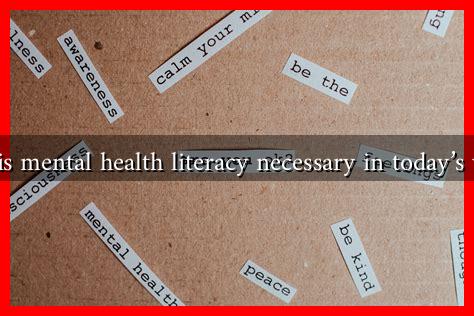-
Table of Contents
Why is Mental Health Literacy Necessary in Today’s World
In an era where mental health issues are increasingly prevalent, understanding mental health literacy has never been more crucial. Mental health literacy refers to the knowledge and beliefs about mental disorders that aid in their recognition, management, and prevention. This article explores the importance of mental health literacy in today’s society, highlighting its role in reducing stigma, improving access to care, and promoting overall well-being.
The Growing Mental Health Crisis
According to the World Health Organization (WHO), approximately 1 in 4 people will experience a mental health issue at some point in their lives. The COVID-19 pandemic has exacerbated this crisis, leading to increased rates of anxiety, depression, and other mental health disorders. The need for mental health literacy is underscored by the following statistics:
- Globally, the prevalence of anxiety and depression increased by 25% in the first year of the pandemic.
- In the United States, nearly 20% of adults experienced mental illness in 2021.
- Suicide is the second leading cause of death among individuals aged 10-34 in the U.S.
These alarming figures highlight the urgency of addressing mental health issues and the necessity of equipping individuals with the knowledge to navigate these challenges effectively.
Reducing Stigma Through Education
One of the most significant barriers to seeking help for mental health issues is the stigma associated with them. Mental health literacy plays a vital role in combating this stigma by fostering understanding and empathy. When individuals are educated about mental health, they are more likely to:
- Recognize the signs and symptoms of mental health disorders.
- Understand that mental health issues are medical conditions, not personal failings.
- Support friends and family members who may be struggling.
For example, campaigns like “Time to Change” in the UK have successfully raised awareness about mental health, leading to a significant reduction in stigma. By promoting mental health literacy, society can create an environment where individuals feel safe to seek help without fear of judgment.
Improving Access to Care
Mental health literacy is also essential for improving access to care. Many individuals do not seek help due to a lack of understanding about available resources or how to navigate the mental health system. By increasing mental health literacy, individuals can:
- Identify when professional help is needed.
- Understand the types of mental health services available, such as therapy, medication, and support groups.
- Learn how to advocate for themselves within the healthcare system.
For instance, a study published in the journal “Psychological Medicine” found that individuals with higher mental health literacy were more likely to seek help and utilize mental health services. This underscores the importance of education in empowering individuals to take charge of their mental health.
Promoting Overall Well-Being
Mental health literacy is not only about addressing mental illness; it also promotes overall well-being. By understanding the factors that contribute to mental health, individuals can adopt healthier lifestyles and coping strategies. This includes:
- Practicing mindfulness and stress management techniques.
- Engaging in regular physical activity.
- Building strong social connections and support networks.
Research indicates that individuals with higher mental health literacy are more likely to engage in positive health behaviors, leading to improved mental and physical health outcomes.
Conclusion
In conclusion, mental health literacy is a critical component of addressing the growing mental health crisis in today’s world. By reducing stigma, improving access to care, and promoting overall well-being, mental health literacy empowers individuals to take control of their mental health. As we continue to navigate the complexities of modern life, investing in mental health education is essential for fostering a healthier, more supportive society. For more information on mental health literacy, consider visiting resources like the [National Alliance on Mental Illness (NAMI)](https://www.nami.org) or the [World Health Organization](https://www.who.int). Together, we can create a world where mental health is prioritized and understood.

